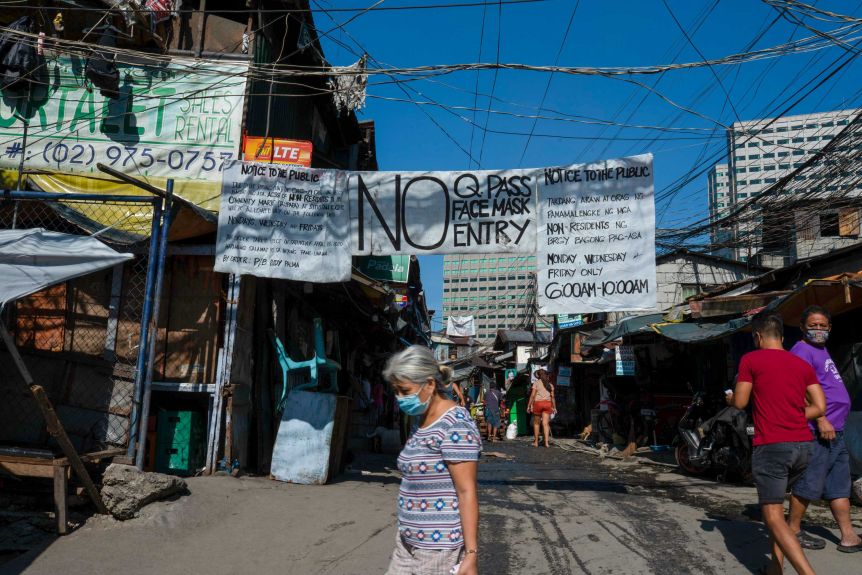
The Philippines has taken some of the most hard-line measures in the world to contain the spread of the coronavirus, with the country reporting almost 8,000 confirmed cases and more than 500 deaths.
The numbers might be dwarfed by the scale of the spread in the United States, the UK, Spain and Italy, but while the Philippines is doing its best to get on top of the virus, the United Nations is among those to raise concerns about police brutality during its lockdown.
More than 30,000 people have been arrested for violating strictly enforced curfew and quarantine restrictions, which are due to last for at least another two weeks.
The problem, according to a human rights group, is that some officials are taking a step too far in the way they’re policing the strict rules.
Authorities have been told to enforce social distancing and while they have had successes, a human rights group is concerned about some punishments being used against perpetrators.
“You can see for instance the situation where … local government officials put violators in dog cages and in coffins,” Carlos Conde from Human Rights Watch told the ABC.
“I think the Government is trying its best to handle this situation, it’s just a matter of how they’re doing it that’s raising some red flags.”
People prohibited from leaving their homes except for essential trips
In the cases Human Rights Watch (HRW) has documented, up to five people were locked in a dog cage.
The official accused of holding the men in the cage has apologised on Facebook and he faces disciplinary action from his police station according to local media.
And there are more examples.
“There is one instance when three members of LGBT communities were arrested for curfew violations,” Mr Conde said.
“Aside from booking them, they were made to dance and were urged to kiss in public while all these things were videoed on Facebook by the government officials.”
The ABC has attempted to contact the President’s office and Quezon City police for comment.
A month-long lockdown has been in place in Luzon, the Philippines’ main island, since March 16.
People have been prohibited from leaving their homes except for essential trips to the grocery store or the pharmacy, or if they are frontline workers.
According to the World Health Organization’s representative in the Philippines, Dr Socorro Escalante, they are seeing some “very positive enforcement” of the measures, particularly at the local levels.
But she said it was difficult to say how effective this enhanced quarantine had been.
“It’s really about how this country will be able to continue to ensure that infections will not be continuously transmitted and also how they’re going to be able to ensure the capacity of the health systems to address this outbreak,” she said.
President Rodrigo Duterte, who has advised people to follow the strict lockdowns, has defended his Government’s measures.
According to Al-Jazeera, Mr Duterte said the public “needed to realise the gravity of the situation because anyone can get sick of the disease”.
“Without these restrictions, this will not end,” he said.
“So if you don’t want to follow, then I will finish you to protect the lives of the innocent who don’t want to die.”
‘A lot more cases’ than what’s been reported in the Philippines
The Philippines is still in the middle of its first wave of the COVID-19 pandemic, and it’s feared there could be some way to go before it reaches its peak and subsides.
“There are a lot of challenges in terms of controlling the transmission of the infection for now,” Dr Escalante said.
“I think we put [in] all the efforts we have, without putting our guard down.”
Dr Escalante said the Philippines had conducted about 30,000 tests, which was low compared with other countries. But she said testing was improving.
“There are a lot of factors that could be considered, one is of course the capacity of a country to do active case finding,” she said.
“Number two of course is the testing, because what we are reporting are laboratory-confirmed cases.
“Over the past weeks, the Government is really stepping up a lot of the capacity of the laboratories — before it was just one in Manila, but now they have opened others.”
The Philippines is facing similar challenges to Indonesia and India.
It’s densely populated, and large swathes of the population live with large families in small homes.
“The fear is that [there are] a lot more cases, a lot more people have died but [are] not being reported precisely because there is lack of testing,”
Mr Conde said.
Extreme measure for lockdown violators
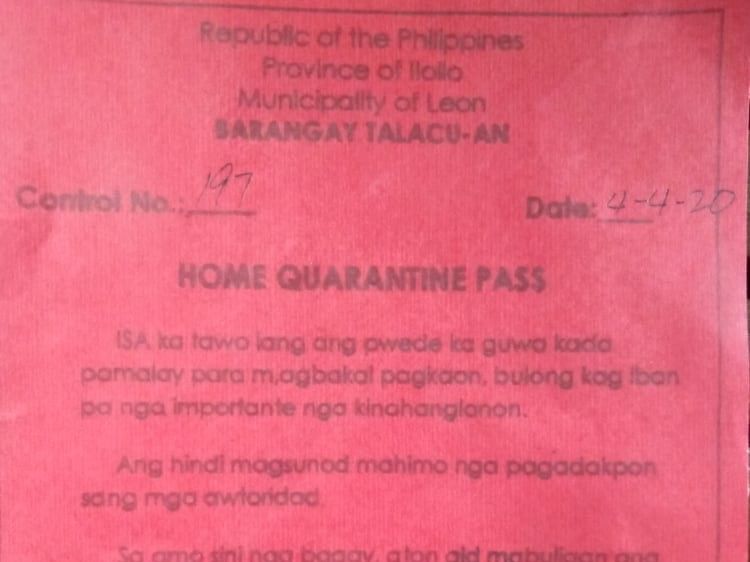
In March, Mr Duterte announced “enhanced community quarantine” measures for two of the country’s main islands.
People have been strictly advised to stay home.
Curfews are in place, only one household member is allowed out at a time and when they do head out, they must carry a pass with them.
There are checkpoints on many street corners that limit travel, even within the capital Manila.
Earlier this month, Mr Duterte told people they needed to adhere to the rules.
“I’m just asking for your discipline,” he said.
“Because if you don’t believe, the military and police will take over. I am ordering them now to be ready.
“The police and military will enforce social distancing and curfews. They will.”
‘Will we survive?’
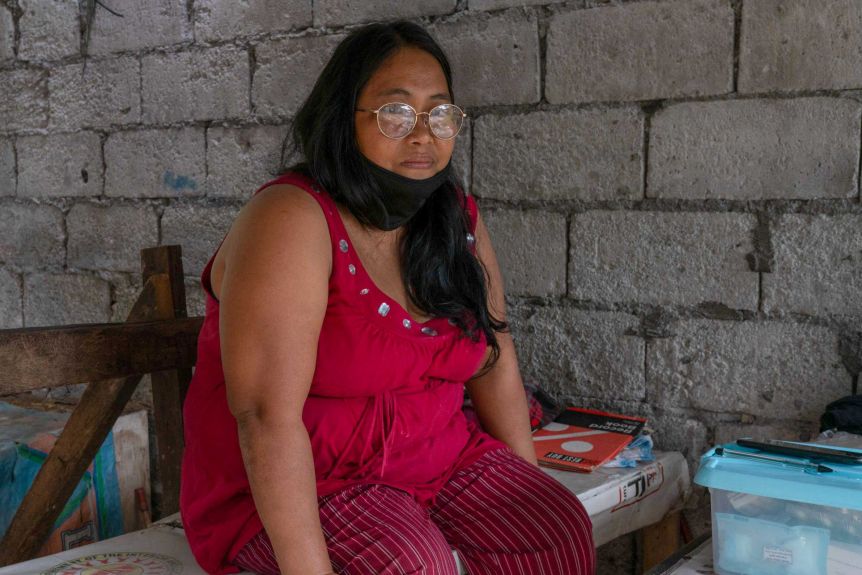
The measures have been particularly hard for the poor in the Philippines.
For Ligaya Sambayon, who lives in Sitio San Roque, the strict lockdowns have meant she has no way to get to the hospital to get medication for her family.
Ligaya is a carer for her wheelchair-bound 19-year-old daughter who has cerebral palsy and usually takes public transport to get her daughter’s medication.
But buses are no longer running in the capital, Manila.
Her family can’t afford other forms of transport because while Ligaya has a job, she is deeply in debt because her daughter’s medication is expensive.
On top of that, she’s been worried that venturing out could mean she could become infected with the virus and expose her family members.
“When the virus surfaced, of course I was afraid because they said the weak are vulnerable to it — my husband had a stroke, my daughter is a person with a disability,” Ligaya told the ABC.
“It instilled fear, that’s why I’m the only one who goes out, my other child is afraid too from what they read. My sisters are worried too.”
News of curfews and a lockdown came as a further blow to the family.
“What will happen to us, especially here, two are on medication, that’s what I thought, ‘will we survive?’,” Ligaya said.
Rights groups say poor ‘suffer the most’
It has led human rights groups to warn that the lockdown and arrests will affect poor people the most.
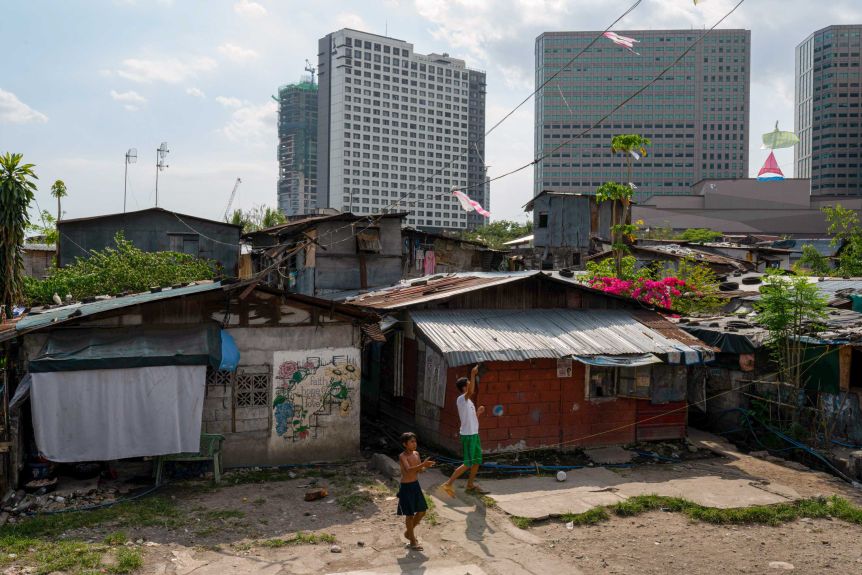
Earlier this month, 21 people were arrested in San Roque when a number of people heard about free food being offered and headed out to find it.
When they gathered and became frustrated when the food failed to materialise, some of the group were arrested for staging a rally without police permission.
Construction worker and widower Jesus Magsayo, who supports three children, said the lockdown in his area had caused severe hardship.
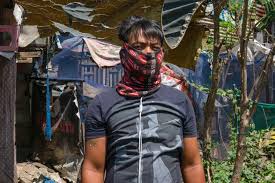
He was among those arrested but released a short time later.
“The hardest part for us is unemployment, we really need work,” he said.
“What will we do until COVID-19 ends, how about my children? My family needs food, money.
“There’s nothing to do but wait for whoever will help us, so our children will be able to eat.”
A ‘social volcano’ threatening to erupt
Lian Buan, a justice reporter with the Filipino news site Rappler, said locking more people up in crowded facilities was concerning.
“Our detention facilities are [at] 300 per cent congestion rate, so if you put people from the outside into that jail system then you risk infecting the current prisoners and you risk infecting all of them in that jail,” she told the ABC.
“This is a health crisis and I think it has to be a more health-oriented solution, rather than a police-oriented solution.
“Human rights violations before the pandemic was already of concern, it’s even more concerning now because of the restrictions of movement and the limitations of what legal redress can do for you and things like that.”
According to rights groups, the problem is that the longer people are locked down without money or enough food, society swings into a precarious position.
“I fear that as the COVID-19 epidemic progresses … this will all add up to a situation where increasingly we see the sign of [a] social volcano threatening to erupt at any moment,” Mr Conde said.
He said crowded communities and the “urban poor” were struggling and they had already begun to see “signs of unrest” among sectors of the population in Manila and in other places.

